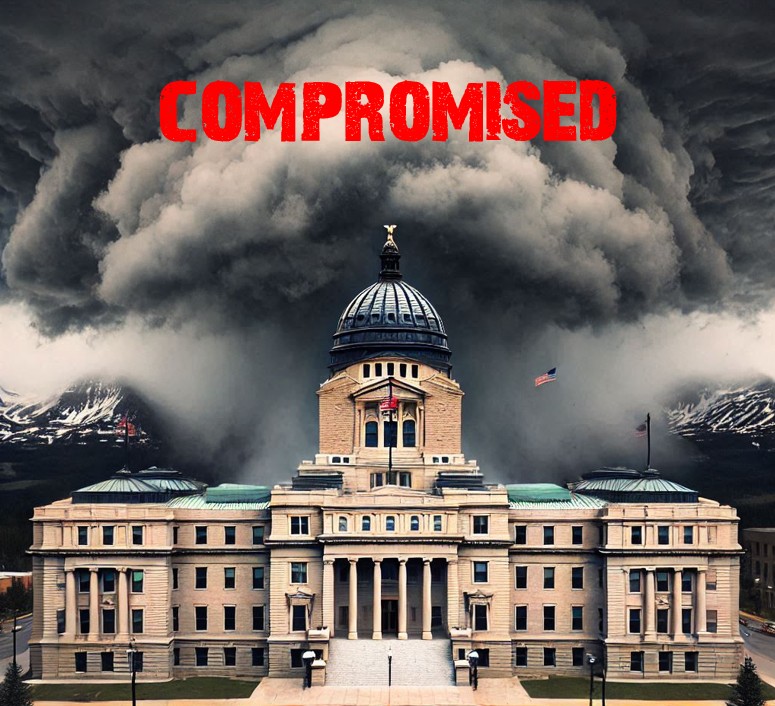
It was a pretty good run. You have to admit that coming back from Fauxcahontas-gate and the 1/1,024th DNA test was pretty miraculous. Rising to the top three, and occasionally #1 in the Democratic primary polling was certainly impressive. But now Elizabeth Warren has built a bridge too far, looked into the abyss, and returned with the following wisdom: trash the Constitution of the United States of America.
This is real, not a red herring. (Speaking of which, Warren's maiden name is Herring, so given her purported Native American heritage, she herself is a "red" Herring! Try that one out at a cocktail party, and you're welcome.)
Warren's bald-faced proposal is of course a Democrat's fever dream: dismantle the process designed to empower all fifty states, not just the liberal coasts. Trash the unique safeguard that has guided our national elections for nearly 250 years...because it's inconvenient for Democrats.
It's typical lefty cant: if you can't win legally, change the rules. Next she'll be calling for an expanded Supreme Court to be packed with liberal justices. She has already called for slavery reparations in a desperate "I keep hot sauce in my purse" grab for black votes.
Warren gets lots of applause for specious lines like "Every vote should count" that willfully ignore the importance of the electoral process.
The Electoral College is embodied not once, but twice in the Constitution: in Article 2, Section 1, and in the 12th Amendment. The founders considered a popular vote but deliberately rejected the idea. So why is it important to maintain the 538 electors?
As Matthew Spalding writes, there are three primary reasons:
1. It protects the liberty and role of diverse states.
--Washington Examiner
The Constitution assigns states presidential electors in the same way it does representation in Congress — providing for popular participation while protecting the various constituencies, in this case the states, through which that consent is reflected. And that protects the diversity of interests and opinions in states, especially small rural ones in the face of large urban ones, whether it be socialism in Vermont or conservatism in Wyoming.
2. It stabilizes national politics.
The founders were concerned about fractious disagreements threatening the stability of the union. The Electoral College discourages regional radicalism and encourages political moderation by forcing candidates to draw support from a broad swath of the country rather than just a few, wealthy, vote-rich areas. Without the Electoral College, candidates today would focus almost exclusively on New York, California, and Texas, ignoring Vermont, North Dakota, Wyoming, and all the other small states, possibly threatening the cohesion that maintains the United States.
3. It limits contested elections and fraud.
An important advantage of the Electoral College is that it keeps election fraud and errors contained within individual states. The 2016 election elevated fears of hacking, fraud, and foreign interference, all of which will only continue to expand with the growth of technology. Right now, all that is contained and mitigated by the Electoral College.
Imagine the criminal chaos of Broward County, Florida, amplified across the entire country.
Another argument is that without it, we cease to be a republic. In effect, the states themselves become meaningless, just lines on a map. As the Federalist argues, the push to abolish is another way to bring the middle of the country to heel, ignoring the historical consequences of elitist overreach:
The final obstacle is the Electoral College. Even here, with the shockingly low standards of civics education in America, and deliberate partisan misinformation from both print and television media, means much of the American population lives not knowing why the Electoral College was made part of the nation’s system in the first place, and how it is the last bastion against majoritarian tyranny.
--The Federalist
The problem is that liberalism as a political philosophy is a universalist concept. Put simply, while paying lip service to diversity liberalism eradicates every difference in favor of homogeneity, certain arbitrary and temporal global values, decided by the elites of the times. This was liberalism’s problem with feudal Europe — which led to the revolutions of the 19th century, which in return led to global peace for more than 70 years under conservative governments that were astute enough to favor order over revolutionary chaos.
The good news is that the framers anticipated charlatans like Warren when they wrote the Constitution. As NPR notes, it would take a massive amount of support to amend the process of electing the president:
Fully overhauling the way the president is selected would take a Constitutional amendment, which would require the votes of two-thirds of the U.S. House of Representatives, two-thirds of the Senate, and three-fourths of the states.
--NPR
In other words, Warren's words are as hollow as her heritage. One wishes we could dismiss her as a rabble-rouser, but such disregard for the primary American document is dangerous indeed. 15 states now support an agreement to deliver their electoral votes to the winner of the popular vote. It isn't hard to imagine this division growing, leading to more partisan rancor.
To disingenuous candidates like Warren who rely on sound bites over substance, that's a good thing.

























Of course the Dems want to do away with the Electoral College, it gets in the way of their cheating.
Without the Electoral College, the only votes that would matter are those in L.A. and New York City. No one else need bother.